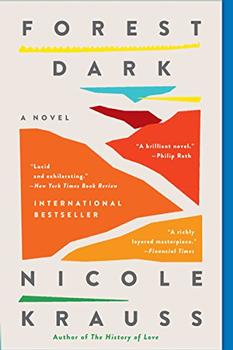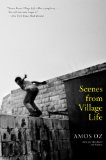Summary | Excerpt | Reading Guide | Reviews | Beyond the book | Read-Alikes | Genres & Themes | Author Bio

A Novel
by David GrossmanTo the End of the Land is timely not only in light of Israel's ongoing conflicts; unfortunately, it will be timely as long as mothers send their sons off to war. The story focuses on Ora, a middle-aged Israeli, who reacts to her son's voluntary re-enlistment by taking an extended backpack trip to avoid news of the war. As Ora hikes the countryside she ruminates on her life and her relationships with her two sons and her former husband. Along with her, initially against his will, is Avram, a physically and emotionally scarred man who has impacted almost every aspect of Ora's life and family.
David Grossman's writing is rich and detailed, nearly every sentence so vivid that one feels exactly what his characters are experiencing. "She shut the door and followed him into a smell that was an entity unto itself, as if she were entering the folds of a thick blanket," he writes. "It was the smell of the inside of suitcases and closed drawers and unaired linen and socks under beds and clumps of dust." I found some paragraphs so beautiful that I had to pause to simply savor Grossman's precise use of the written word, deeply moved by his mastery, not to mention the skills of his translator, Jessica Cohen. He also has a marvelous ability to convey the complex emotions of his characters. They become real, their motivations and confusion perfectly understandable. On the surface, Ora's compulsion to be unreachable for a time seems a bit daft, but as her reasoning becomes apparent, her rationale, her vital need to get away, become eminently logical.
"What now? Where was I? The door. The lower part of the door. Four short bars over thick frosted glass. She takes three sheets of A4 paper from the printer and tapes them over the glass. That way she won't see their military boots. And now what?... It occurs to her that they could arrive in the middle of all sorts of things. Like when she's unpacking the groceries and putting things in the fridge. Or when she sits down and watches television. Or when she sleeps, or when she's in the bathroom, or when she's chopping vegetables for soup… It gradually dawns on her that every movement she makes may be the last before the knock on the door."
The narrative reflects how one's mind works when on autopilot, and as such, the novel is not a linear account, but flows backwards and forwards in time as Ora remembers various incidents that occurred throughout the past forty years, making for a contemplative and nostalgic novel with little action. This format, as well as Grossman's detailed descriptions of Ora's environs, make this book a gorgeous but rather slow read. The first fifty pages in particular, which relate teenage Ora's first encounter with Avram and Ilan, her future husband, are told from the perspective of someone in a fever dream. While important to the development of the novel, it's difficult to decipher and could discourage many from reading beyond this section.
The novel is more or less apolitical, which is surprising given Grossman's loss of his own younger son to the Palestinian conflict. It is, however, strongly anti-war, depicting the costs incurred over generations of fighting. Avram's story, also relayed by Ora, is an unforgettable and heart-rending portrayal of the effects of war on a one-time gifted individual. His journey with Ora is one of healing, and the sections of the novel that focus on his experiences provide a much needed counterbalance to hers and prevent the novel from becoming too bogged down.
I have seen reviews comparing To the End of the Land to both Anna Karenina and War and Peace, which make me a bit leery; only time will tell if a current novel is destined to become a classic. It is, however, one of the more beautifully written books I've been privileged to read in recent memory. It's probably not a novel that will appeal to everyone, as it's certainly a slow read, but those who love great writing will want to put this one on their lists.
![]() This review was originally published in The BookBrowse Review in October 2010, and has been updated for the
September 2011 edition.
Click here to go to this issue.
This review was originally published in The BookBrowse Review in October 2010, and has been updated for the
September 2011 edition.
Click here to go to this issue.

If you liked To the End of the Land, try these:

by Nicole Krauss
Published 2018
Bursting with life and humor, Forest Dark is a profound, mesmerizing novel of metamorphosis and self-realization—of looking beyond all that is visible towards the infinite.

by Amos Oz
Published 2012
A portrait of a fictional village, by one of the world's most admired writers.
Your guide toexceptional books
BookBrowse seeks out and recommends the best in contemporary fiction and nonfiction—books that not only engage and entertain but also deepen our understanding of ourselves and the world around us.